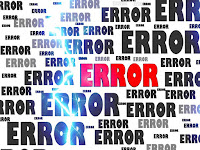Getting Your Facts Straight: 5 Useful Sources
Several years ago, while taking a Creative Writing class at a local university, something bugged me about a classmate's short story. It gave me pause until I realized the problem. His main character, while driving at night in heavy traffic, noticed the flashing brake lights of the cars in oncoming traffic.
I'll give you a moment to think about it. Re-read the last sentence of the previous section if you missed it.
Ok. Time's up.
If cars are heading toward you, you can not see their brake lights.
My current writing group knows I will check their writing for accuracy. It's not that I'm an expert on everything, because I'm not. If you're writing about guns, I probably won't catch a mistake, but if it's about something I know or love (giraffes, raising kids, growing up in the South) I'll be all over it. I'm not alone. My writing group is great in this regard. In fact our members will sometimes pre-empt any questions on accuracy by saying, "I checked this already, and it's correct."
This is the source of the old adage: "Write what you know."
Just like the brake lights issue, if you get your facts wrong, your reader will stop reading...for a moment or completely. The more important the fact is to your story, the more likely they are to put your book aside and pick up something else.
Correct me if I'm wrong, but I'm thinking you don't want them to stop reading your book.
You don't have to avoid a topic if you don't know it, though. Research it so you do know it.
Today there is no excuse for not doing your research. You can go about this in many ways, but here are five easy sources for getting your facts straight:
Even if you try all of these methods, you might have fact-based errors still, but hopefully they won't be the kind that makes your reader stop reading.
What's the worst fact-based error you've ever seen in a book? Did you keep reading or stop?
Did You Catch the Mistake?
I'll give you a moment to think about it. Re-read the last sentence of the previous section if you missed it.
Ok. Time's up.
If cars are heading toward you, you can not see their brake lights.
My current writing group knows I will check their writing for accuracy. It's not that I'm an expert on everything, because I'm not. If you're writing about guns, I probably won't catch a mistake, but if it's about something I know or love (giraffes, raising kids, growing up in the South) I'll be all over it. I'm not alone. My writing group is great in this regard. In fact our members will sometimes pre-empt any questions on accuracy by saying, "I checked this already, and it's correct."
Why Does Accuracy Matter?
This is the source of the old adage: "Write what you know."
Just like the brake lights issue, if you get your facts wrong, your reader will stop reading...for a moment or completely. The more important the fact is to your story, the more likely they are to put your book aside and pick up something else.
Correct me if I'm wrong, but I'm thinking you don't want them to stop reading your book.
You don't have to avoid a topic if you don't know it, though. Research it so you do know it.
How Can You Avoid Fact-Based Errors?
Today there is no excuse for not doing your research. You can go about this in many ways, but here are five easy sources for getting your facts straight:
- The Internet: In today's electronic world, you can't claim a lack of information for poor fact-checking. When you use the internet, make sure you find a reputable site for your information. If your only reference came from wikipedia, keep digging. When I needed to know what a boar sounded like when shot by an arrow, I googled it. There are numerous videos and audio files about this. Who knew? I found several and listened to them in order to get my description correct.
- Subject Matter Experts: Are you writing about military weapons? Ask a veteran or current service member. They can tell you what guns, ammo, explosives, etc. they use.
- Librarians: You can call the reference desk of any library and ask them to help you with information, and they will do it. Guess what? It's their job to answer research questions.
- DIY: Do you want to write about archery? Then do what I did: try it. Nothing brings an experience to life better than your own experience.
- Critique Groups: Don't forget your beta readers or writing groups. If you have a diverse group, you will have a broad spectrum of knowledge to pull from. Sometimes, one person will question a point, and others might have thoughts related to that point. A group discussion is always a good thing when trying to get your facts straight.
Even if you try all of these methods, you might have fact-based errors still, but hopefully they won't be the kind that makes your reader stop reading.
What's the worst fact-based error you've ever seen in a book? Did you keep reading or stop?



Comments